Sectors and brands: a dominant triumvirate
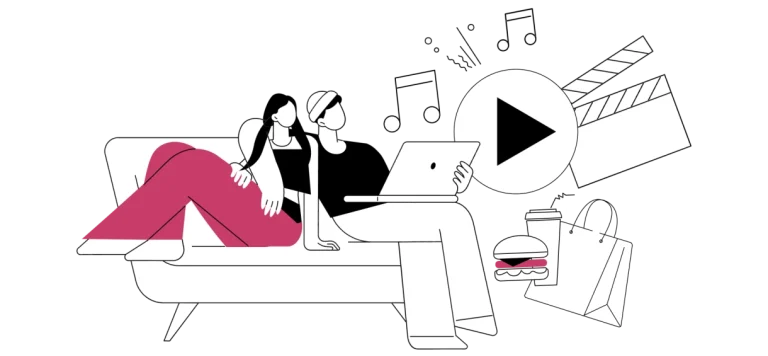

Clothing, food and air travel: top of the low-cost tree
While the low-cost concept has gradually spread to all sectors, three in particular have grown to embody the concept more powerfully. Clothing, food and air travel are the three sectors most synonymous with low-cost products, according to 66%, 62% and 58% of Europeans, respectively. In fourth place is mobile telephony, which reflects how successful operators have been in developing low-cost offerings in what is often a highly competitive field. Conversely, the car industry, a market in which Dacia’s success caused something of a paradigm shift, is rarely associated with the low-cost concept (39%). The same goes for banks, despite the emergence of a substantial online market, as well as energy, a sector that has recently been opened to competition in a number of countries (Fig. 8).
Fig 8 – Level of development of low-cost according to sectors
Download this infographic for your presentations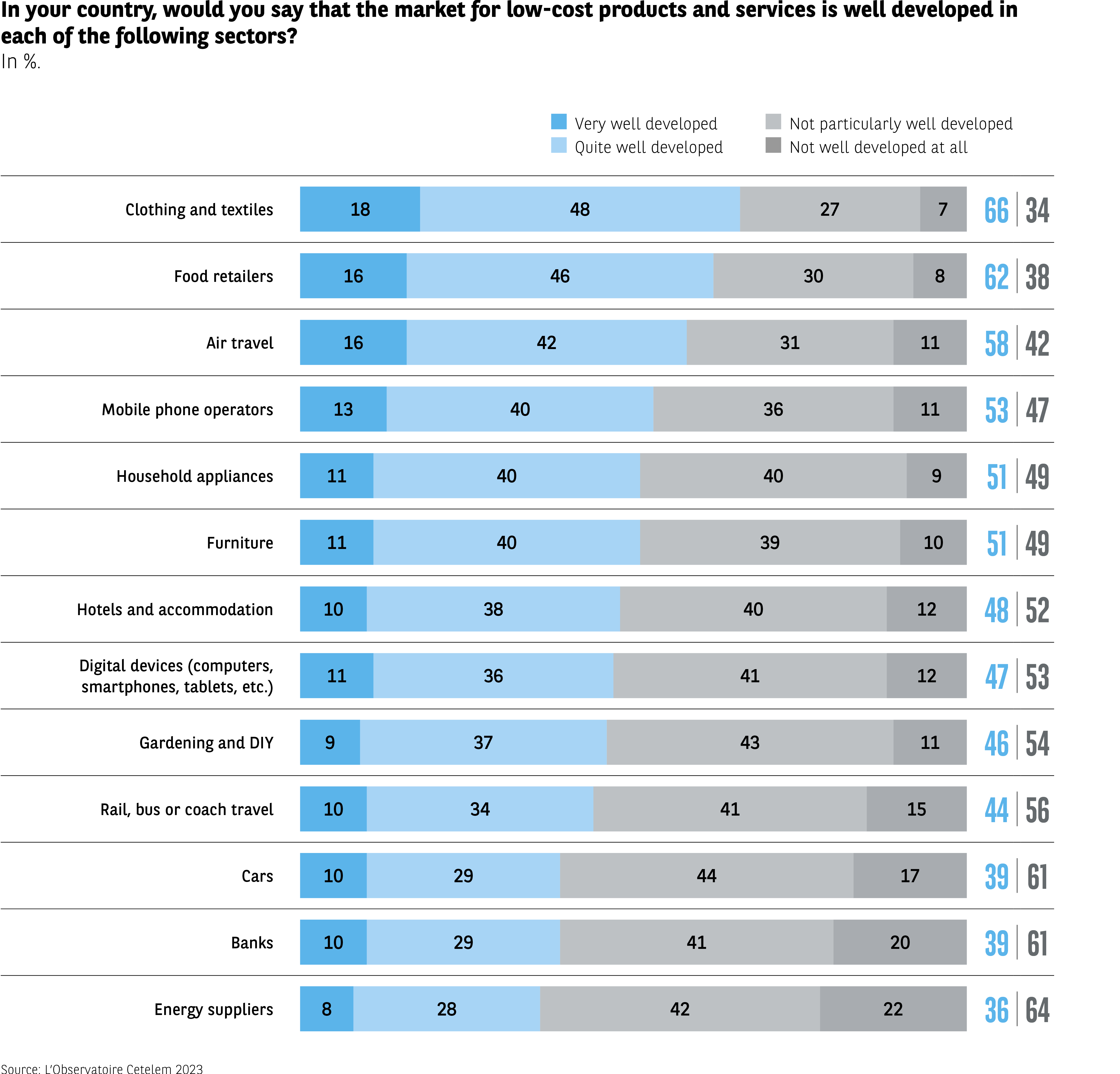 The infographic presents, in percentage, the level of development of the low-cost market in 13 sectors. The responses are divided into “Very developed”, “Rather developed”, “Rather not developed”, and “Not at all developed”.
Data by sector:
1. Clothing, textiles
Very developed: 18%
Rather developed: 48%
Rather not: 27%
Not at all: 7%
Total developed: 66% – Total not developed: 34%
2. Food retailers
16% / 46% / 30% / 8%
Total developed: 62% – Not developed: 38%
3. Air transport
16% / 42% / 31% / 11%
Total developed: 58% – Not developed: 42%
4. Mobile phone operators
13% / 40% / 36% / 11%
Total developed: 53% – Not developed: 47%
5. Appliances
11% / 40% / 40% / 9%
Total developed: 51% – Not developed: 49%
6. Furniture
11% / 40% / 39% / 10%
Total developed: 51% – Not developed: 49%
7. Hotels, accommodation
10% / 38% / 40% / 12%
Total developed: 48% – Not developed: 52%
8. Digital tools (computers, smartphones, tablets)
11% / 36% / 41% / 12%
Total developed: 47% – Not developed: 53%
9. Gardening and DIY
9% / 37% / 43% / 11%
Total developed: 46% – Not developed: 54%
10. Rail, bus, or car transport
10% / 34% / 41% / 15%
Total developed: 44% – Not developed: 56%
11. Automobile
10% / 29% / 44% / 17%
Total developed: 39% – Not developed: 61%
12. Banks
10% / 29% / 41% / 20%
Total developed: 39% – Not developed: 61%
13. Energy providers
8% / 28% / 42% / 22%
Total developed: 36% – Not developed: 64%
The perceived development is highest in textiles, food, and air transport, and lowest in energy, banking, and automobiles.
Source: Cetelem Observatory 2023
The infographic presents, in percentage, the level of development of the low-cost market in 13 sectors. The responses are divided into “Very developed”, “Rather developed”, “Rather not developed”, and “Not at all developed”.
Data by sector:
1. Clothing, textiles
Very developed: 18%
Rather developed: 48%
Rather not: 27%
Not at all: 7%
Total developed: 66% – Total not developed: 34%
2. Food retailers
16% / 46% / 30% / 8%
Total developed: 62% – Not developed: 38%
3. Air transport
16% / 42% / 31% / 11%
Total developed: 58% – Not developed: 42%
4. Mobile phone operators
13% / 40% / 36% / 11%
Total developed: 53% – Not developed: 47%
5. Appliances
11% / 40% / 40% / 9%
Total developed: 51% – Not developed: 49%
6. Furniture
11% / 40% / 39% / 10%
Total developed: 51% – Not developed: 49%
7. Hotels, accommodation
10% / 38% / 40% / 12%
Total developed: 48% – Not developed: 52%
8. Digital tools (computers, smartphones, tablets)
11% / 36% / 41% / 12%
Total developed: 47% – Not developed: 53%
9. Gardening and DIY
9% / 37% / 43% / 11%
Total developed: 46% – Not developed: 54%
10. Rail, bus, or car transport
10% / 34% / 41% / 15%
Total developed: 44% – Not developed: 56%
11. Automobile
10% / 29% / 44% / 17%
Total developed: 39% – Not developed: 61%
12. Banks
10% / 29% / 41% / 20%
Total developed: 39% – Not developed: 61%
13. Energy providers
8% / 28% / 42% / 22%
Total developed: 36% – Not developed: 64%
The perceived development is highest in textiles, food, and air transport, and lowest in energy, banking, and automobiles.
Source: Cetelem Observatory 2023
Lidl, Ryanair and Aldi: a renowned trio
Thus, three sectors stand out, but so do three brands.
Lidl tops the list, having been cited spontaneously by 16% of Europeans, followed by Ryanair, the brand that revolutionized the airline industry, and Aldi, the first established retailer to take the low-cost route (Fig. 9).
Fig 9 – Brands most associated with low-cost
Download this infographic for your presentations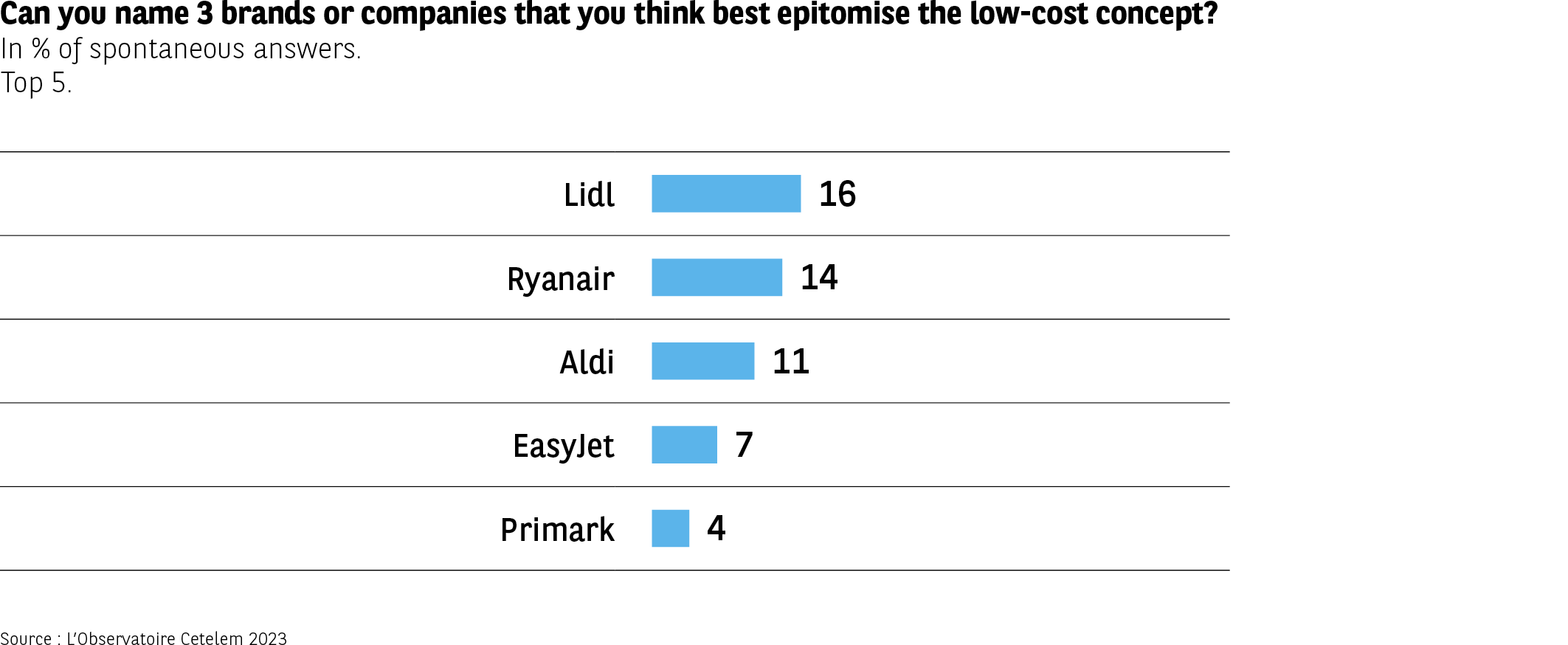 The infographic presents the five most frequently cited brands when respondents are asked to name up to three companies that symbolize low-cost. The results are expressed as a percentage of spontaneous responses.
Data:
Lidl: 16%
Ryanair: 14%
Aldi: 11%
EasyJet: 7%
Primark: 4%
Food retailers (Lidl, Aldi) and air transport (Ryanair, EasyJet) are among the brands most associated with low-cost.
Source: Cetelem Observatory 2023
The infographic presents the five most frequently cited brands when respondents are asked to name up to three companies that symbolize low-cost. The results are expressed as a percentage of spontaneous responses.
Data:
Lidl: 16%
Ryanair: 14%
Aldi: 11%
EasyJet: 7%
Primark: 4%
Food retailers (Lidl, Aldi) and air transport (Ryanair, EasyJet) are among the brands most associated with low-cost.
Source: Cetelem Observatory 2023
But although these three brands have a truly international reach, a geographical analysis highlights certain particularities specific to each country. Poland’s Biendronka, for example, is a decidedly local low-cost phenomenon (Fig. 10).
Fig 10 – Brand most associated with low-cost by country
Download this infographic for your presentations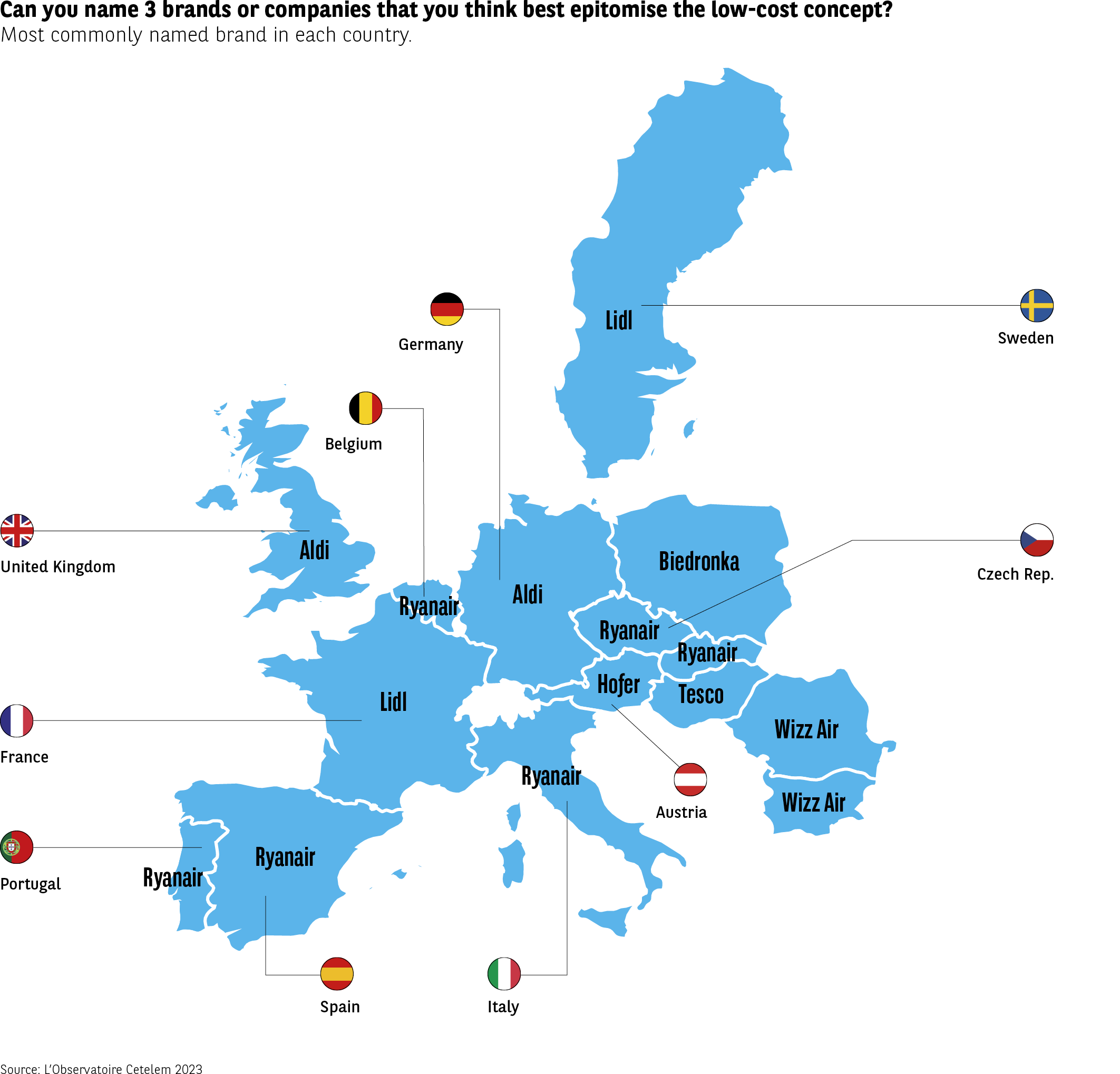 The infographic represents a map of Europe indicating, for each country studied, the brand most frequently cited as a symbol of low-cost. Each country is associated with a single brand. The labels are placed around or inside the borders depending on the available space.
Data by country:
Germany: Lidl
Austria: Hofer
Belgium: Aldi
Bulgaria: Wizz Air
Spain: Ryanair
France: Lidl
Hungary: Wizz Air
Italy: Ryanair
Poland: Biedronka
Portugal: Ryanair
Czech Republic: Tesco
Romania: Wizz Air
Slovakia: Ryanair
Sweden: Lidl
United Kingdom: Aldi
According to the countries, food retailers (Lidl, Aldi, Biedronka) or low-cost airlines (Ryanair, Wizz Air) are the most frequently cited.
Source: Cetelem Observatory 2023
The infographic represents a map of Europe indicating, for each country studied, the brand most frequently cited as a symbol of low-cost. Each country is associated with a single brand. The labels are placed around or inside the borders depending on the available space.
Data by country:
Germany: Lidl
Austria: Hofer
Belgium: Aldi
Bulgaria: Wizz Air
Spain: Ryanair
France: Lidl
Hungary: Wizz Air
Italy: Ryanair
Poland: Biedronka
Portugal: Ryanair
Czech Republic: Tesco
Romania: Wizz Air
Slovakia: Ryanair
Sweden: Lidl
United Kingdom: Aldi
According to the countries, food retailers (Lidl, Aldi, Biedronka) or low-cost airlines (Ryanair, Wizz Air) are the most frequently cited.
Source: Cetelem Observatory 2023
Fig 11 – Main low-cost brands in Europe by sector
Download this infographic for your presentations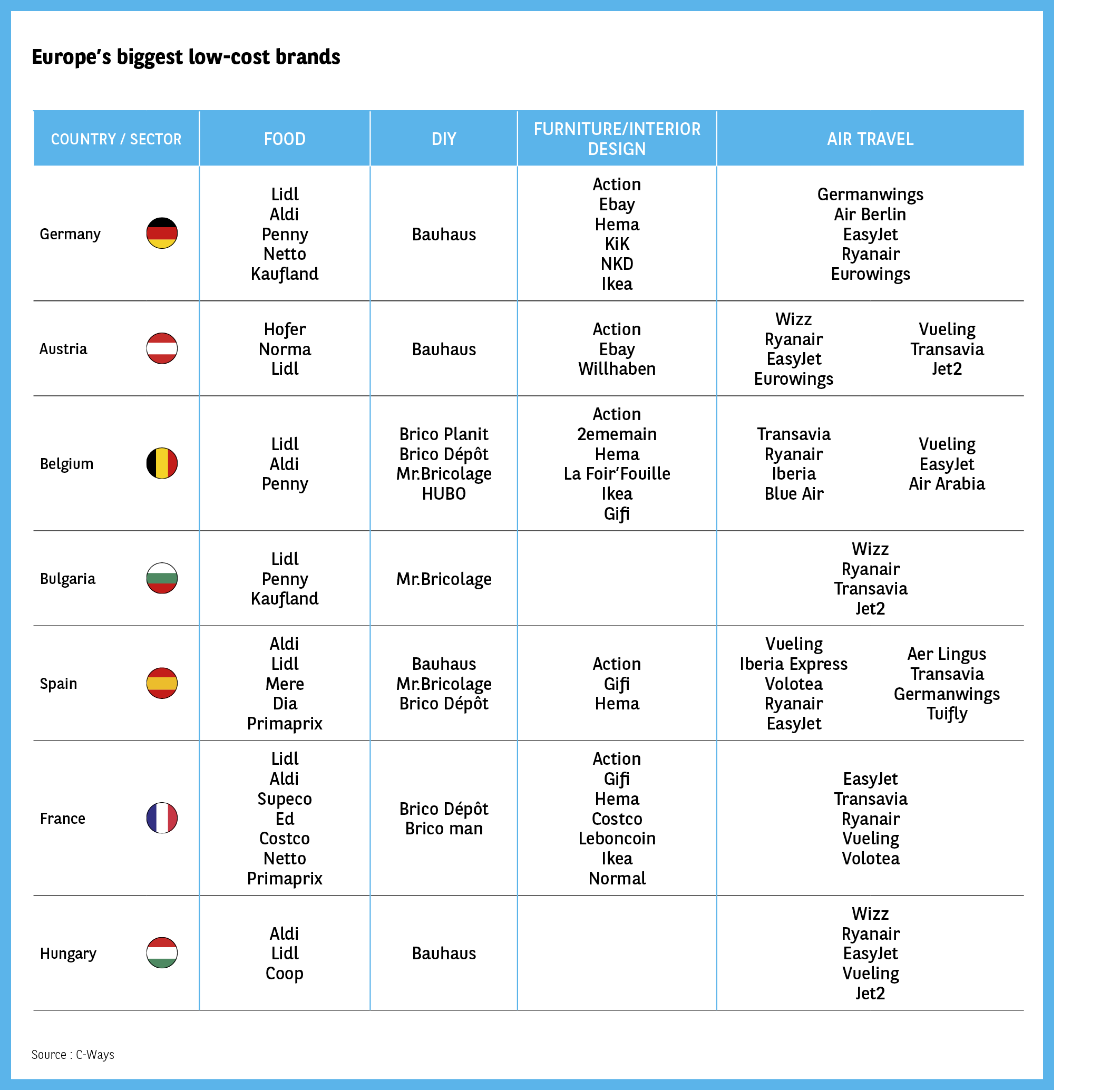 The infographic presents a table similar to the previous one, covering eight additional countries. The sectors remain: food, DIY, furniture/decoration, air transport.
Table data:
Germany
Food: Lidl, Aldi, Penny, Netto, Kaufland
DIY: Bauhaus
Furniture/decoration: Action, Ebay, Hema, KiK, NKD, Ikea
Air transport: Germanwings, Air Berlin, EasyJet, Ryanair, Eurowings
Austria
Food: Hofer, Norma, Lidl
DIY: Bauhaus
Furniture/decoration: Action, Ebay, Willhaben
Air transport: Wizz, Ryanair, EasyJet, Eurowings, Vueling, Transavia, Jet2
Belgium
Food: Lidl, Aldi, Penny
DIY: Brico Planit, Brico Dépôt, Mr Bricolage, HUBO
Furniture/decoration: Action, 2ememain, Hema, La Foir’Fouille, Ikea, Gifi
Air transport: Transavia, Ryanair, Iberia, Blue Air, Vueling, EasyJet, Air Arabia
Bulgaria
Food: Lidl, Penny, Kaufland
DIY: Mr Bricolage
Air transport: Wizz, Ryanair, Transavia, Jet2
Spain
Food: Aldi, Lidl, Mere, Dia, Primaprix
DIY: Bauhaus, Mr Bricolage, Brico Dépôt
Furniture/decoration: Action, Gifi, Hema
Air transport: Vueling, Iberia Express, Volotea, Ryanair, EasyJet, Aer Lingus, Transavia, Germanwings, TUIFly
France
Food: Lidl, Aldi, Supeco, Ed, Costco, Netto, Primaprix
DIY: Brico Dépôt, Brico Man
Furniture/decoration: Action, Gifi, Hema, Costco, Leboncoin, Ikea, Normal
Air transport: EasyJet, Transavia, Ryanair, Vueling, Volotea
Hungary
Food: Aldi, Lidl, Coop
DIY: Bauhaus
Air transport: Wizz, Ryanair, EasyJet, Vueling, Jet2
Lidl, Aldi, Ikea, Bauhaus, and low-cost airlines dominate the list of most representative brands in each country.
Source: C-Ways
The infographic presents a table similar to the previous one, covering eight additional countries. The sectors remain: food, DIY, furniture/decoration, air transport.
Table data:
Germany
Food: Lidl, Aldi, Penny, Netto, Kaufland
DIY: Bauhaus
Furniture/decoration: Action, Ebay, Hema, KiK, NKD, Ikea
Air transport: Germanwings, Air Berlin, EasyJet, Ryanair, Eurowings
Austria
Food: Hofer, Norma, Lidl
DIY: Bauhaus
Furniture/decoration: Action, Ebay, Willhaben
Air transport: Wizz, Ryanair, EasyJet, Eurowings, Vueling, Transavia, Jet2
Belgium
Food: Lidl, Aldi, Penny
DIY: Brico Planit, Brico Dépôt, Mr Bricolage, HUBO
Furniture/decoration: Action, 2ememain, Hema, La Foir’Fouille, Ikea, Gifi
Air transport: Transavia, Ryanair, Iberia, Blue Air, Vueling, EasyJet, Air Arabia
Bulgaria
Food: Lidl, Penny, Kaufland
DIY: Mr Bricolage
Air transport: Wizz, Ryanair, Transavia, Jet2
Spain
Food: Aldi, Lidl, Mere, Dia, Primaprix
DIY: Bauhaus, Mr Bricolage, Brico Dépôt
Furniture/decoration: Action, Gifi, Hema
Air transport: Vueling, Iberia Express, Volotea, Ryanair, EasyJet, Aer Lingus, Transavia, Germanwings, TUIFly
France
Food: Lidl, Aldi, Supeco, Ed, Costco, Netto, Primaprix
DIY: Brico Dépôt, Brico Man
Furniture/decoration: Action, Gifi, Hema, Costco, Leboncoin, Ikea, Normal
Air transport: EasyJet, Transavia, Ryanair, Vueling, Volotea
Hungary
Food: Aldi, Lidl, Coop
DIY: Bauhaus
Air transport: Wizz, Ryanair, EasyJet, Vueling, Jet2
Lidl, Aldi, Ikea, Bauhaus, and low-cost airlines dominate the list of most representative brands in each country.
Source: C-Ways
Fig 11 (part 2) – Main low-cost brands in Europe by sector
Download this infographic for your presentations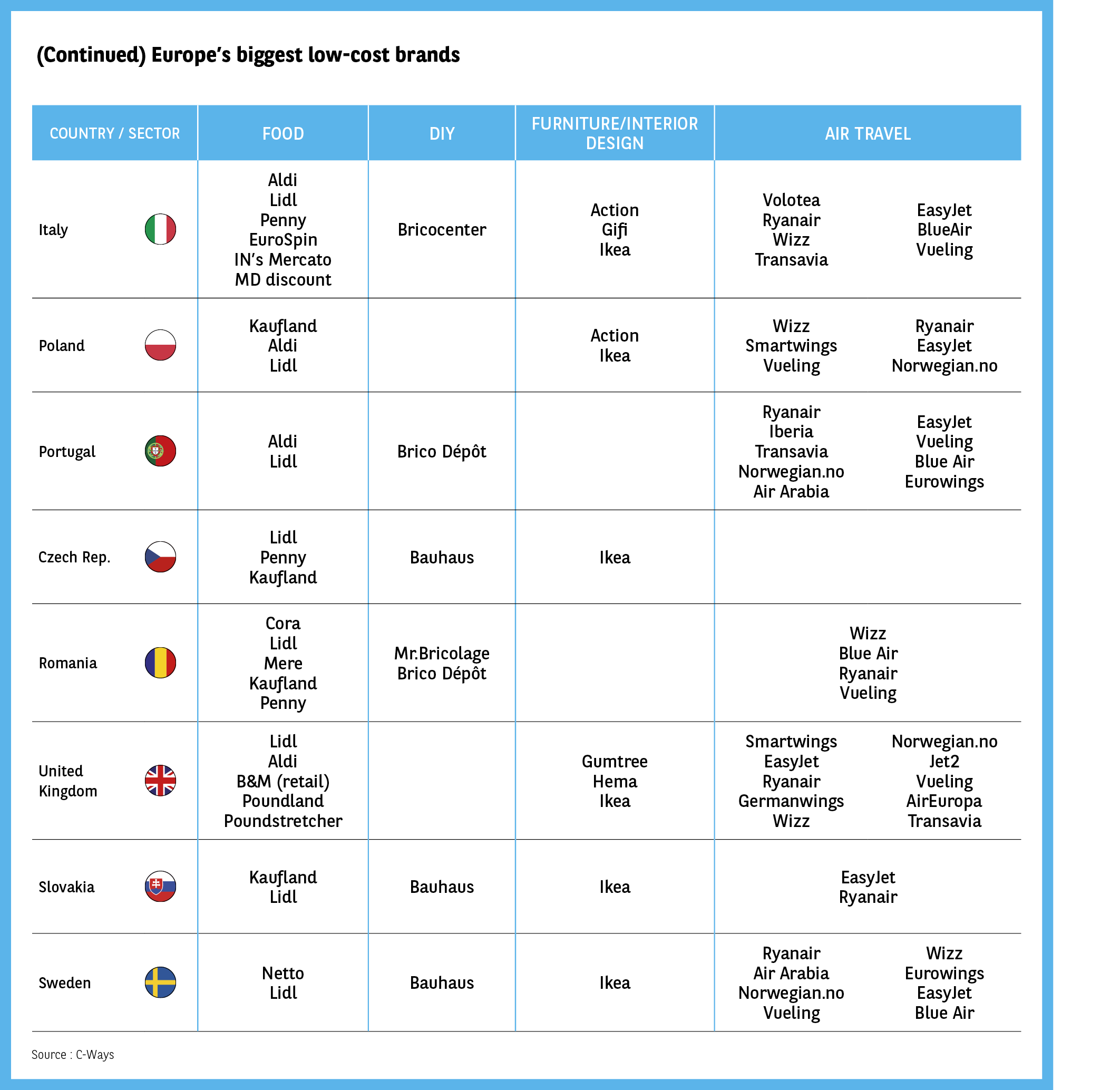 The infographic presents a table listing the main low-cost brands for eight European countries. The sectors covered are: food, DIY, furniture/decoration, and air transport.
Table data:
Italy
Food: Aldi, Lidl, Penny, EuroSpin, IN’s Mercato, MD Discount
DIY: Bricocenter
Furniture/decoration: Action, Gifi, Ikea
Air transport: Volotea, Ryanair, Wizz, Transavia, EasyJet, BlueAir, Vueling
Poland
Food: Kaufland, Aldi, Lidl
Furniture/decoration: Action, Ikea
Air transport: Wizz, Smartwings, Vueling, Ryanair, EasyJet, Norwegian.no
Portugal
Food: Aldi, Lidl
DIY: Brico Dépôt
Air transport: Ryanair, Iberia, Transavia, Norwegian.no, Air Arabia, EasyJet, Vueling, Blue Air, Eurowings
Czech Republic
Food: Lidl, Penny, Kaufland
DIY: Bauhaus
Furniture/decoration: Ikea
Romania
Food: Cora, Lidl, Mere, Kaufland, Penny
DIY: Mr Bricolage, Brico Dépôt
Air transport: Wizz, Blue Air, Ryanair, Vueling
United Kingdom
Food: Lidl, Aldi, B&M (distribution), Poundland, Poundstretcher
Furniture/decoration: Gumtree, Hema, Ikea
Air transport: Smartwings, EasyJet, Ryanair, Germanwings, Wizz, Norwegian.no, Jet2, Vueling, AirEuropa, Transavia
Slovakia
Food: Kaufland, Lidl
DIY: Bauhaus
Furniture/decoration: Ikea
Air transport: EasyJet, Ryanair
Sweden
Food: Netto, Lidl
DIY: Bauhaus
Furniture/decoration: Ikea
Air transport: Ryanair, Air Arabia, Norwegian.no, Vueling, Wizz, Eurowings, EasyJet, Blue Air
The most frequent low-cost brands vary by country, with a recurring presence of Lidl, Aldi, Bauhaus, Ikea, and airlines like Ryanair or EasyJet.
Source: C-Ways
The infographic presents a table listing the main low-cost brands for eight European countries. The sectors covered are: food, DIY, furniture/decoration, and air transport.
Table data:
Italy
Food: Aldi, Lidl, Penny, EuroSpin, IN’s Mercato, MD Discount
DIY: Bricocenter
Furniture/decoration: Action, Gifi, Ikea
Air transport: Volotea, Ryanair, Wizz, Transavia, EasyJet, BlueAir, Vueling
Poland
Food: Kaufland, Aldi, Lidl
Furniture/decoration: Action, Ikea
Air transport: Wizz, Smartwings, Vueling, Ryanair, EasyJet, Norwegian.no
Portugal
Food: Aldi, Lidl
DIY: Brico Dépôt
Air transport: Ryanair, Iberia, Transavia, Norwegian.no, Air Arabia, EasyJet, Vueling, Blue Air, Eurowings
Czech Republic
Food: Lidl, Penny, Kaufland
DIY: Bauhaus
Furniture/decoration: Ikea
Romania
Food: Cora, Lidl, Mere, Kaufland, Penny
DIY: Mr Bricolage, Brico Dépôt
Air transport: Wizz, Blue Air, Ryanair, Vueling
United Kingdom
Food: Lidl, Aldi, B&M (distribution), Poundland, Poundstretcher
Furniture/decoration: Gumtree, Hema, Ikea
Air transport: Smartwings, EasyJet, Ryanair, Germanwings, Wizz, Norwegian.no, Jet2, Vueling, AirEuropa, Transavia
Slovakia
Food: Kaufland, Lidl
DIY: Bauhaus
Furniture/decoration: Ikea
Air transport: EasyJet, Ryanair
Sweden
Food: Netto, Lidl
DIY: Bauhaus
Furniture/decoration: Ikea
Air transport: Ryanair, Air Arabia, Norwegian.no, Vueling, Wizz, Eurowings, EasyJet, Blue Air
The most frequent low-cost brands vary by country, with a recurring presence of Lidl, Aldi, Bauhaus, Ikea, and airlines like Ryanair or EasyJet.
Source: C-Ways
